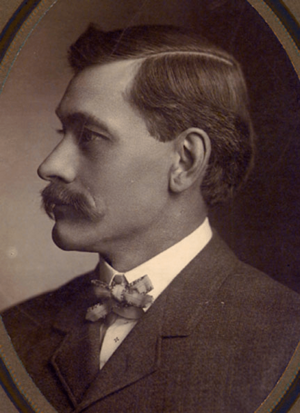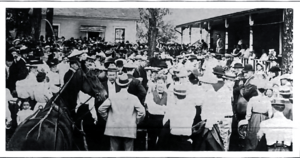Spirit Fruit Society facts for kids
The Spirit Fruit Society was a special group in the United States. It started after a time when many businesses struggled in the 1890s. The group began in Lisbon, Ohio. Over the years, they moved to Ingleside, Illinois and then to California. Even though people sometimes spread rumors and attacked them in newspapers, the group lasted until 1930. It never had many members, but the Spirit Fruit Society lasted longer and was more successful than most other American groups that tried to create a perfect society.
The group's name comes from their belief that people's spiritual state is like a plant's bud or blossom. They thought a person's soul had not yet fully grown into a fruit. The main goal of the society was to help the soul grow completely. Jacob L. Beilhart, who started the group, said that people are like "underdeveloped 'plants'" that still need to produce their "final fruit." The group's main ideas were about being selfless, working hard, being understanding, and living in peace.
Contents
Who Was Jacob Beilhart?
The Spirit Fruit Society was founded by Jacob Beilhart (born March 4, 1867; died November 24, 1908). He grew up in Columbiana County, Ohio. His father was Lutheran, and his mother was Mennonite. Jacob was raised in a very religious home.
When he was 18, Beilhart moved to Kansas. There, he met and married Olive Louema Blow. Her family belonged to the Seventh-day Adventist church, which Jacob then joined. Jacob and Louema went to the Adventist College in Healdsburg, California. Jacob became a preacher. The couple returned to Kansas, where he started preaching. After two years, Beilhart stopped preaching. He felt he wanted to "do something besides talk." He strongly wanted to help sick people. So, he joined a nursing program at the Battle Creek Sanitarium. This place was run by Dr. John Harvey Kellogg.
Beilhart became friends with C. W. Post, who had been a patient at the sanitarium. Post's health got much better with the help of a "faith healer." In 1892, Post opened his own health center called La Vita Inn. He hired Beilhart to help him. Both men learned about Christian Science. Beilhart also helped Post create his cereal drink, Postum. Post and Beilhart did not agree with all Christian Science ideas. However, they believed that sickness was an illusion. They thought it could be overcome by positive thinking and self-sacrifice.
While in Kansas, Beilhart explored many different beliefs. These included Christian Science, Divine Science, Spiritualism, and Theosophy. But he found that none of these religions fully held his interest. Over time, he realized he would not stick to just one religion. Instead, he decided to create his own faith by combining ideas from several different beliefs.
What Were Their Beliefs?
Strictly speaking this is not a religion. We came here because we became dissatisfied with the frivolities and faddisms of what people call religion. We do not preach, we practice.
Beilhart did not believe in owning many things. He thought that being jealous, having doubts, and fearing losing someone's love caused much sickness. He felt that giving up personal possessions helped people reach the "Fruit of the Universal Spirit."
Members of the Spirit Fruit Society lived by these main rules:
- Find happiness by being selfless.
- Follow your own conscience.
- Take responsibility for your actions.
- Understand how your actions affect others.
- Accept whatever happens.
Beilhart strongly believed that each person should guide their own actions. They should not be told what to do by others. Even though there was no official leader title, Beilhart likely made important decisions. There are no records of any arguments between members.
We don't have many personal stories about life in the society. To clear up misunderstandings, Beilhart often wrote to newspapers. He explained how the group worked.
The members worked together and shared everything they owned. If someone needed money, they could take it from the community's supply. The women in the society sewed, helped print newsletters, and did housework. The men worked on the farm. A key idea of the society was the "free gift." This meant if anyone wanted something they had, especially printed materials, they just had to ask. It would be given to them for free. After reading or seeing the society, people could donate if they wished. But it was always stressed that it was a "free gift," not a payment. The society taught that to become more spiritual and less selfish, everyone should control their natural desires. They believed in business and societal laws. However, they felt people would rise above those laws when they fully controlled their lower nature. Still, they maintained that they should obey the laws.
History of the Society
Starting in Lisbon, Ohio
In 1896, Beilhart returned to Lisbon, Ohio, near where he grew up. In 1899, Beilhart decided to create a special community. He wanted to practice his new beliefs and show them to others. After the American Civil War, many similar groups started in the U.S. Economic problems in the late 1800s also encouraged more such groups. The Spirit Fruit Society was officially recognized as a religious organization in 1901. Their goal was to "teach mankind how to apply the truths taught by Jesus Christ." Beilhart did not try hard to get new members. Sometimes, he even turned people away if he felt they were not right for the group. Because of this, the community only had about a dozen residents, mostly from outside the area.
The group did not beg or bother their neighbors. Beilhart preached in Chicago and other places. But he did not strongly try to convert people. The group usually kept to themselves. However, their mysterious nature led to misunderstandings and suspicion in newspapers. For example, the birth of Beilhart's niece, Evelyn, caused concern. Her mother, Mary Beilhart (Jacob's sister), was not married to the child's father. Also, a teenager named Katherine Herbeson came from Chicago. Newspapers reported that she was either held against her will or brainwashed. Her father and brother came and took her away, even though she did not want to leave. More negative news came when Beilhart disagreed with his wife's request for money after they separated.
In 1904, many newspaper articles, especially in Chicago, wrote about the society. These articles were often dramatic and showed the society in a bad way. The society's views, especially against marriage, were not well accepted in Lisbon, Ohio. A local newspaper even printed a warning that had been shared in the community. It called for people to gather and tell the Spirit Fruit farm members to leave or face the consequences.
In June 1904, Beilhart invited the public to an 'open house'. He tried to explain the group's reasons and beliefs. Over 400 people came. It is said that famous people like Clarence Darrow and Elbert Hubbard attended. Beilhart did visit Hubbard, and Darrow often visited the society later. In the end, the people of Lisbon could not accept the society's ideas, especially their views on marriage. In late 1904, the group left Lisbon for Chicago. They hoped their modern ideas would be better accepted there.
Ingleside, Illinois, and Beilhart's Death
In 1905, Beilhart bought 90 acres near Ingleside, Illinois, by Wooster Lake. About a dozen members moved with Beilhart to Illinois. A few new members also joined. Over the next two years, the society built a large house and a big barn by hand. Their Illinois neighbors accepted them better than the people in Lisbon had. On the land by the lake, the members built a concrete-block home. They called it the "Spirit Fruit Temple." This large house had 32 rooms and modern features for that time. The dining room could fit up to 100 people. The society lived peacefully in Ingleside for several years. They grew their own food on what became known as the "Spirit Fruit Farm." They also welcomed visitors and produced their newsletter. Beilhart continued to speak to groups in Chicago, sharing the society's ideas.
In November 1908, Beilhart became very sick with appendicitis. Even after surgery, he died three days later. Following the society's simple beliefs, Beilhart was buried in a plain coffin in an unmarked grave overlooking Wooster Lake. Today, none of the buildings remain, as a housing development covers the area. However, Beilhart's grave is still there in a hidden corner.
Often, when a strong leader dies, groups like this fall apart. But the Spirit Fruit Society kept going. This made them special among groups of that time. Even though the community continued, their two publications, Spirit Voice and Spirit Fruit, stopped being made. Virginia Moore was chosen as the new president after Beilhart's death. The community stayed together and continued their activities. In 1911, the society advertised in local papers to sell their lakefront property. Virginia Moore said the Illinois weather was not good for their activities. So, they decided to move to California. In the winter of 1914–1915, the society moved west.
California and the End
In 1915, the society bought 80 acres of land in Soquel, California. They named it "Hilltop Ranch." By this time, only 12 members of the society remained. These included Mary Beilhart's two children, who were now 11 and 15 years old. Just like in Ohio and Illinois, the group did not try to find new members. However, three new members did join during this time.
The main goal of the society then was simply to survive. To stay together, they had to focus all their energy on growing food. This was hard because many members were getting old, and several were sick. Since the beginning, Beilhart and the others had not actively looked for new members. They believed a small group was better. This proved to be their downfall. There were no younger members to keep the farm going. The original members, who had been with the group since it started, began to leave. By 1928, only six were left. Financial problems forced them to give up the ranch. They moved to a house in the village of Soquel.
The group finally ended in 1930 when Virginia Moore died. After her death, the remaining members of the Spirit Fruit Society went to live with friends and family. Even with a small number of members, the society had existed for almost 30 years. This was 20 years after its founder died.
Why Was the Society Successful?
The Spirit Fruit Society never had more than about twenty members. They never actively looked for new members or tried to convert people. Like many such groups, they were often criticized by newspapers and were the subject of untrue stories. Despite this, and even after their leader, Beilhart, died, the society lasted longer than most other similar communities at that time.
The society's ideas came from Christianity, but they also shared things in common. The members were not strictly tied to just one set of beliefs. Some experts suggest this is why the society lasted so long. Instead of being stuck with one belief system, the members could easily adapt and solve everyday problems within the community. They could also handle threats from outside.
Images for kids
 | Aaron Henry |
 | T. R. M. Howard |
 | Jesse Jackson |





